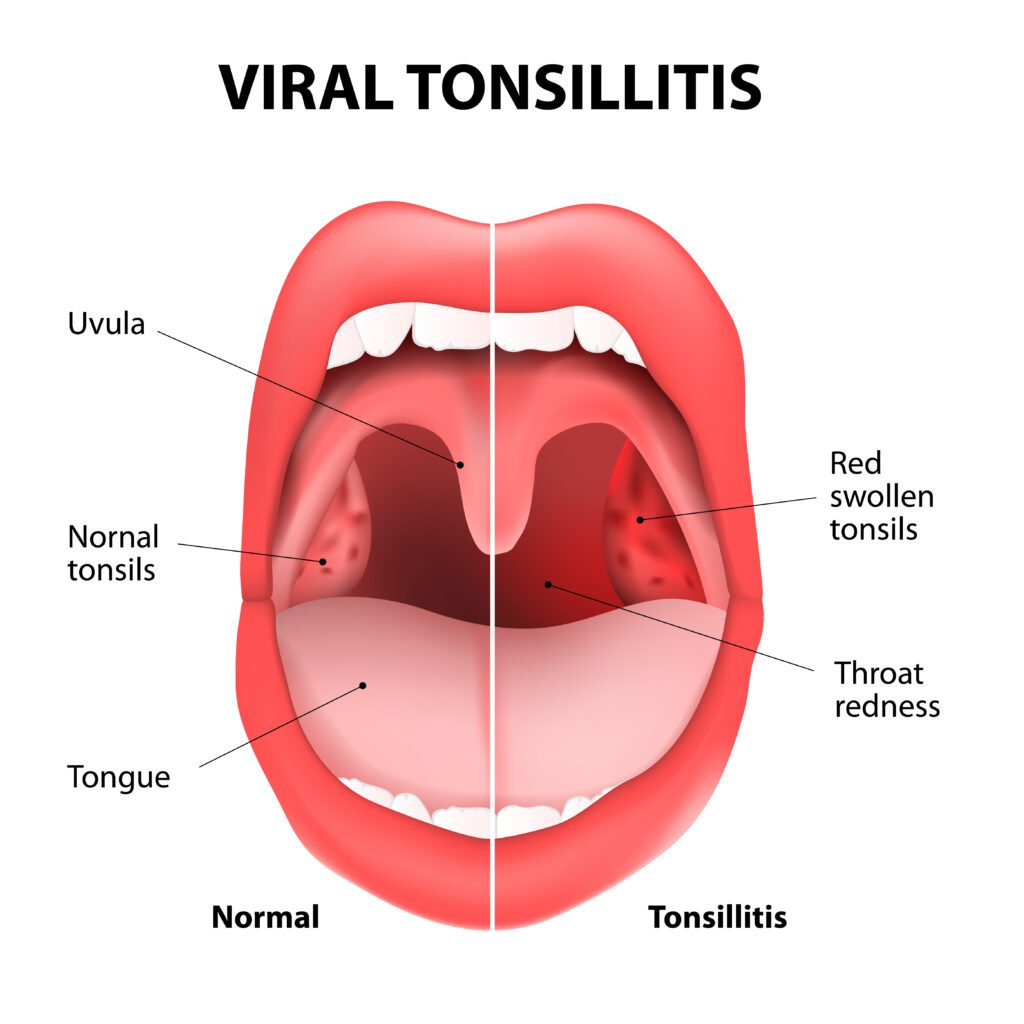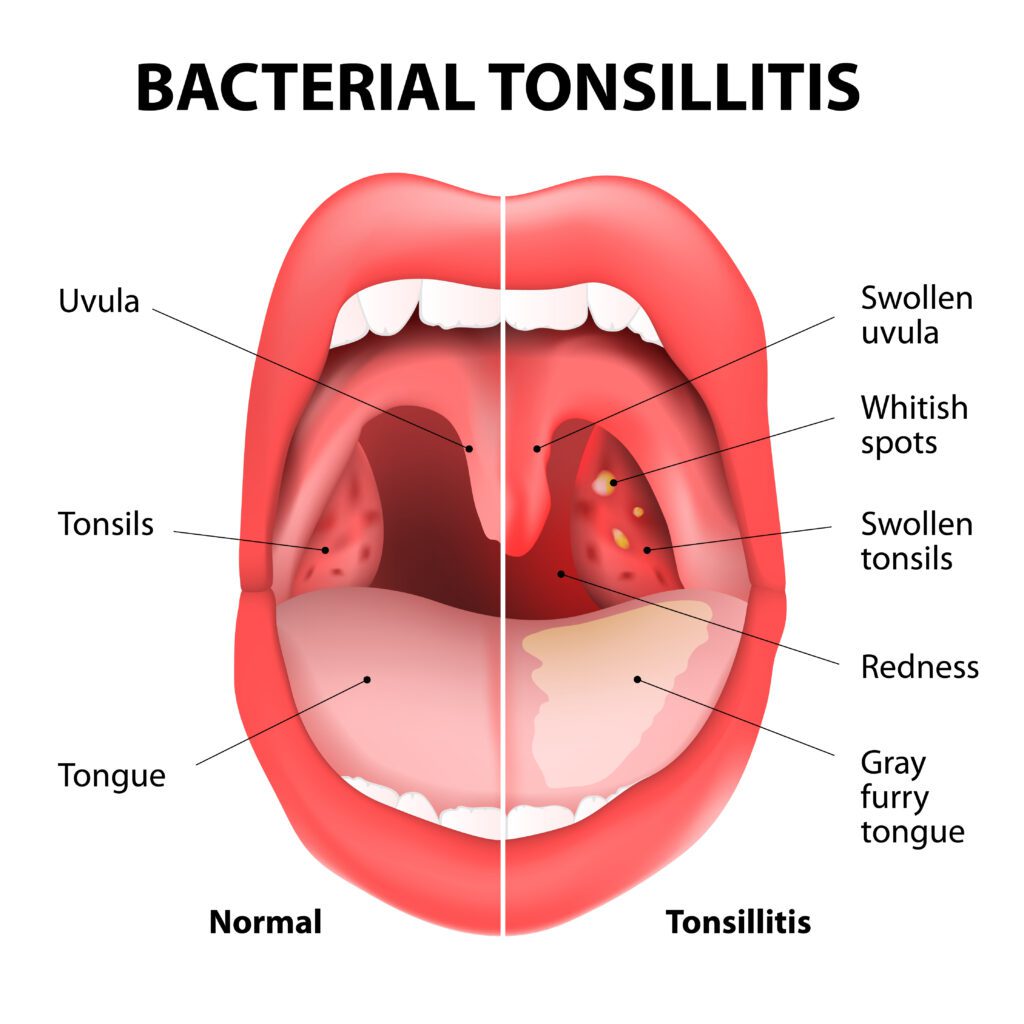Tonsillitis is an infection of the tonsils, two pads of tissue located at the back of the throat. It is caused by a virus or bacteria and can be accompanied by other symptoms such as enlarged lymph nodes and fever. Tonsillitis can affect adults and children and may require medical attention if not appropriately treated. This guide will cover everything you need to know about tonsillitis, including its causes, symptoms, and treatments.

A Brief Introduction to Tonsillitis
Tonsillitis is an infection that can cause a sore throat and make you feel swollen. There are different types of tonsillitis, but the most common type is caused by either a virus or bacteria. This infection can affect people of all ages — from young children to adults.
The Importance of Understanding Tonsillitis
Understanding tonsillitis and how to treat it properly is crucial, as it can be painful and cause complications if left untreated. Additionally, different treatments are available depending on the type of infection you have. Knowing tonsillitis’s signs, symptoms, and treatments can help you quickly recognize when you or a loved one is suffering from this condition and get proper care.
What Is Tonsillitis?
So you were diagnosed with tonsillitis and want to know more about it. We’ve got you covered!
Definition and Overview of Tonsillitis
Tonsillitis occurs when the tonsils, the two oval-shaped tissue pads at the back of your throat, become inflamed due to a bacterial or viral infection. This inflammation often results in symptoms such as a sore throat, difficulty swallowing, and painful swollen, enlarged tonsils.
The Role of Tonsils in the Immune System
The tonsils play a crucial role in the immune system by trapping germs that could enter your airways and cause infection. When the tonsils become infected, they become inflamed and swollen, which can cause pain and discomfort.
Is Strep Throat the Same as Tonsillitis?
Though strep throat and tonsillitis have similar symptoms, they are not the same condition. Strep throat is caused by a specific type of bacteria, streptococcal bacteria, while tonsillitis can be caused by either a virus or other bacteria. Additionally, a strep infection may cause more severe symptoms than tonsillitis. A streptococcal infection can be treated by antibiotics, whereas a viral infection cannot. Therefore, getting a diagnosis from your doctor is essential so you can receive the proper treatment.
Different Varieties of Tonsillitis
There are three primary diagnoses for tonsillitis: acute, recurrent, and chronic.
Acute Tonsillitis
Acute tonsillitis is a temporary condition that often comes on quickly and lasts for several days. Symptoms usually last around 3–4 days but may persist for up to 2 weeks.
Recurrent Tonsillitis
Recurrent tonsillitis refers to multiple episodes of acute tonsillitis within a year. Individuals with recurrent infections experience several instances of the illness, leading to frequent sore throats and swollen tonsils.
Chronic Tonsillitis
Chronic tonsillitis, on the other hand, is a persistent infection that lasts longer than acute. This chronic infection is characterized by persistent sore throat, bad breath, enlarged tonsils, and swelling or irritation in the surrounding tissue. Chronic tonsillitis can be caused by viral and bacterial tonsillitis infections, including the streptococcus bacteria, which is also responsible for strep throat.
Causes of Tonsillitis
Both viral and bacterial infections can cause tonsillitis.

Viral Infections Leading To Tonsillitis
Viral tonsillitis is more common and often resolves on its own. This type of tonsillitis is typically caused by common viruses such as the flu, colds, or mono.

Bacterial Infections Causing Tonsillitis
Bacterial tonsillitis, on the other hand, is less common and often requires antibiotics to treat. The most common bacteria responsible for this type of infection is group A streptococcus (GAS), which can also cause strep throat.
The Difference Between Bacterial and Viral Tonsillitis
The difference between these two types of tonsillitis is that to treat bacterial tonsillitis, the patient typically requires antibiotics, while viral tonsillitis does not. Furthermore, symptoms of bacterial and viral infections can be quite similar, so it is important to see a doctor if you experience any of the signs of an infection for more than a few days. Chronic tonsillitis can be caused by either viral or bacterial infections.
Tonsillitis Symptoms
Tonsillitis occurs with a variety of symptoms. Depending on which type of tonsillitis you have, your symptoms may vary.
Common Tonsillitis Symptoms
The most common symptoms of tonsillitis include sore throat, swollen red tonsils, trouble swallowing, sore lymph nodes, hoarseness or loss of voice, and fatigue. Other symptoms include fever, bad breath, stuffy nose, and upset stomach. Some people may also experience difficulty breathing, mainly if the tonsils are large.
If bacterial tonsillitis is not treated promptly, it can lead to complications such as an abscess (a pocket of pus) or even rheumatic fever.
Chronic Tonsillitis Symptoms
If you suffer from chronic tonsillitis, you may experience different symptoms than those associated with acute or recurrent tonsillitis. These can include frequent sore throat, bad breath, and trouble swallowing food. Additionally, the tonsils may be enlarged and red, and there may be white or yellow patches of pus on them.
How Recurrent Tonsillitis Presents Itself
If you experience recurrent tonsillitis, your symptoms may vary from one episode to the next. This can include sore throat, swollen tonsils, fever, and difficulty swallowing. The lymph nodes on either side of your neck may also be tender or swollen. This can be the first sign of an episode of recurrent tonsillitis.

Diagnosis of Tonsillitis
Diagnosing acute, chronic, and recurrent tonsillitis usually involves a physical examination and a throat swab to identify the cause of the infection. This procedure shouldn’t hurt, but it may cause some minor discomfort. Your doctor may also order a blood test to check for signs of infection, such as an elevated white blood cell count.
The Importance of an Accurate Diagnosis
Getting an accurate diagnosis of tonsillitis is important, as it can help your doctor identify the best treatment plan for you. Additionally, bacterial infections require antibiotics, while viral infections do not, so it’s essential to know which type of infection you have before beginning any treatment.
Complications of Tonsillitis
Tonsillitis can cause some severe complications if left untreated. These include further infections, abscesses in the throat, and difficulty breathing. It’s important to seek medical treatment if you experience any of these symptoms as soon as possible.
Short-Term Complications
Short-term complications of tonsillitis may include:
- Peritonsillar Abscess: A peritonsillar abscess is an abscess in the area around the tonsils, which can cause severe pain and trouble swallowing. Treatment for this complication usually involves draining the abscess and antibiotics to clear up any remaining infection.
- Tonsillar Cellulitis: Cellulitis of the tonsils is an infection of the lymphatic tissue surrounding the tonsils, which can cause swelling and difficulty swallowing. Treatment for this condition usually involves antibiotics to clear up any remaining infection.
Long-Term Complications
Sometimes tonsillitis can cause long-term complications, such as:
- Permanent Voice Change: Repeated episodes of tonsillitis can lead to permanent changes in the voice, such as hoarseness or a higher pitch. Treatment options for this condition may include speech therapy or surgery to remove the tonsils.
- Recurring Ear Infections: Recurrent infections of the tonsils can cause repeated ear infections, which may require antibiotics to clear up and prevent serious complications.
- Obstructive Sleep Apnea: Tonsillitis can also cause sleep apnea, characterized by breathing pauses during sleep. This can lead to daytime fatigue, difficulty concentrating, and an increased risk of heart disease. A doctor may recommend surgery to remove the infected tonsils to treat sleep apnea.
- Rheumatic Fever: Untreated bacterial tonsillitis can sometimes lead to rheumatic fever, a serious complication that can cause joint pain, skin rash, and heart problems. Treatment options for this condition typically involve antibiotics and anti-inflammatory medications.
- Scarlet Fever: Occasionally tonsillitis can cause scarlet fever. This is a bacterial infection characterized by fever, sore throat, and a rash on the body. Treatment for this condition usually involves antibiotics to clear up the infection.
It is important to seek medical treatment if you experience tonsillitis symptoms, as early diagnosis and treatment can help prevent serious long-term complications or even life-threatening infections. Your doctor can provide the best advice on managing your condition and what treatments are available.
Tonsillitis in Adults vs. Children
While tonsillitis is common in school-age children, it can also occur in adults. Adults may experience similar symptoms but are less likely to have frequent infections.
Tonsillitis in Children
Tonsillitis is much more common in children than adults, especially those between the ages of 5 and 15. This is because their immune systems are still developing, and they are more likely to come into contact with the bacteria or viruses that can cause tonsillitis. Symptoms in children may include sore throat, fever, swollen tonsils, and trouble swallowing. Children that have recurring episodes of tonsillitis may need to have their tonsils removed. It’s essential to keep an eye on very young children with tonsillitis. If they are having trouble breathing, seek medical attention immediately.
Tonsillitis in Adults
Tonsillitis is less common in adults, but it can still occur. Symptoms may include sore throat, fever, swollen lymph nodes, and difficulty swallowing. Additionally, adults with recurrent tonsillitis may experience ear pain or changes in their voice. Some adults may benefit from having their tonsils removed if recurrent tonsillitis is causing significant problems.

Treatment of Tonsillitis
The treatment for tonsillitis depends on the cause. Viral tonsillitis often resolves independently, while bacterial tonsillitis may require antibiotics to fight the strep bacteria.
In rare cases of chronic or recurrent tonsillitis that doesn’t respond to other treatments, a tonsillectomy (a surgical procedure to remove the tonsils) may be necessary.
Treating Viral Tonsillitis
Viral tonsillitis often resolves on its own without any treatment. You can relieve symptoms of viral tonsillitis by drinking plenty of fluids, gargling with warm salt water, and getting plenty of rest. Over-the-counter pain relievers such as ibuprofen or acetaminophen may help ease sore throat discomfort.
Treating Bacterial Tonsillitis
Bacterial tonsillitis is usually treated with antibiotics, such as penicillin. To prevent a bacterial infection from reoccurring, it’s essential to finish the entire course of antibiotics, even if symptoms have disappeared.
Treating Chronic or Recurrent Tonsillitis
A tonsillectomy may be necessary in cases of chronic or recurrent tonsillitis that does not respond to other treatments. This surgical procedure removes the tonsils and can help reduce the risk of recurrent infections.
Antibiotic Resistance with Tonsillitis
Resistance to antibiotics is a significant problem in treating bacterial tonsillitis. It’s important to take antibiotics as prescribed and only use them when necessary to reduce the risk of developing resistance. Additionally, it’s important to know that antibiotics will not work for viral tonsillitis, so taking them could harm your immune system for your next infection.
Preventing Tonsillitis
While there are measures you can take to reduce your risk of getting tonsillitis, such as washing your hands frequently and avoiding frequent exposure to people who have the infection, it’s not always possible to prevent the condition. If you or your child develop symptoms of tonsillitis, it’s important to seek medical treatment immediately. Early diagnosis and treatment can help reduce the risk of complications.
Ultimately, the best way to prevent tonsillitis is to practice good hygiene and see your doctor regularly for checkups.
Measures to Prevent Frequent Tonsil Infections
Tonsillitis can lead to long-term complications, such as permanent voice changes or recurring ear infections. Therefore, it’s crucial to take measures to prevent frequent tonsil infections. This includes washing your hands often, avoiding contact with people with an infection, getting plenty of rest and fluids, and seeking medical advice if symptoms occur. Taking these precautions can prevent complications and reduce your risk of recurrent infections.
When is Surgery Necessary?
Surgery may be an option for those who experience recurrent tonsillitis that does not respond to other treatments. This procedure, called a tonsillectomy, involves the surgical removal of the tonsils and can help reduce the risk of recurring throat infections. However, speaking with your doctor about all the risks and benefits is crucial before deciding on surgery.
What to Expect with Surgery
Tonsillectomy is typically done under general anesthesia, so you won’t be awake or feel pain during the procedure. Recovery time depends on the type of surgery performed and your overall health, but most people can expect to return to normal activities within a few days.
After surgery, it’s important to get plenty of rest and follow your doctor’s instructions on how to care for yourself. This may include taking pain medications as prescribed, avoiding strenuous activities, and drinking plenty of fluids.
Living with Tonsillitis
Tonsillitis can be painful and uncomfortable, particularly if it’s a chronic condition. But with proper treatment and preventive measures, it is possible to reduce the risk of recurrent episodes. Practicing good hygiene, seeking medical advice if symptoms occur, and following your doctor’s instructions for managing complications are important. By taking these steps, you can help ensure that your tonsillitis does not become a long-term problem.
Impact on Daily Life
Tonsillitis can have a significant impact on your daily life. Symptoms such as sore throat, fever, and trouble swallowing can make it difficult to eat or talk. Additionally, complications from tonsillitis can cause long-term changes in your voice or the need for additional medical procedures, such as surgery.
Coping Strategies for Tonsillitis
There are things you can do to cope with the symptoms of tonsillitis.
- Take Care of Yourself: It’s important to practice good hygiene and get plenty of rest.
- Take Over-the-Counter Medications: Over-the-counter pain relievers may also help relieve sore throat discomfort. Throat lozenges and throat sprays can also be used to provide temporary relief.
- Drink Warm Liquids: Drinking warm liquids such as tea or broth can help soothe a sore throat and ease other symptoms.
- Follow Instructions: It’s important to follow your doctor’s instructions and take any prescribed medications as directed to reduce the risk of complications from tonsillitis.
How Can Tonsillitis Affect Dental Health?
Tonsillitis can lead to problems with dental health, as the infection can cause sores on the tongue and throat, making it difficult for you to swallow. Also, sore throat pain may make brushing or flossing your teeth properly uncomfortable, leading to an increased risk of cavities or gum disease. It’s important to follow your doctor’s instructions and take any prescribed medications as directed to reduce the risk of complications. Additionally, your dentist may recommend toothpaste and mouthwash with added antibacterial properties to help fight the infection.

Can a Dentist Diagnose Tonsillitis?
In most cases, tonsillitis is diagnosed by a primary care physician or an ear, nose, and throat specialist. However, your dentist may be able to diagnose the condition if they detect any signs of infection in your mouth or throat during a routine dental checkup. Symptoms that may indicate tonsillitis include redness and swelling of the tonsils, white patches on the tonsils, tender lymph nodes in the neck, and a sore throat. If your dentist notices any of these symptoms during an examination, they may recommend that you see a doctor for further testing or treatment.
In conclusion, tonsillitis is a common but potentially uncomfortable condition. Understanding tonsillitis is vital to managing it effectively. Knowing the types, symptoms, and treatments can help you seek timely medical attention and avoid complications.
If you suspect you have tonsillitis, don’t hesitate to seek professional help. With early diagnosis and appropriate treatment, most people recover quickly and completely.
At Patient Empowered Dentistry, we’re committed to providing you with the knowledge and resources you need to maintain optimal oral health. Our experienced and compassionate dental professional team provides comprehensive preventive, restorative, and cosmetic services to ensure you feel your best. Contact us today to learn more about how we can help you.
We look forward to hearing from you!



